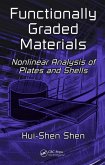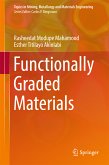Despite a number of existing papers on the analysis of functionally graded materials and structures, there is no single book that is devoted entirely to the analysis of functionally graded beams, plates and shells using different methods, e.g.,analytical or semi-analytical methods.
Filling this gap in the literature, the book offers a valuable reference resource for senior undergraduates, graduate students, researchers, and engineers in this field. The results presented here can be used as a benchmark for checking the validity and accuracy of other numerical solutions. They can also be used directly in the design of functionally graded materials and structures.
Dieser Download kann aus rechtlichen Gründen nur mit Rechnungsadresse in A, B, BG, CY, CZ, D, DK, EW, E, FIN, F, GR, HR, H, IRL, I, LT, L, LR, M, NL, PL, P, R, S, SLO, SK ausgeliefert werden.









